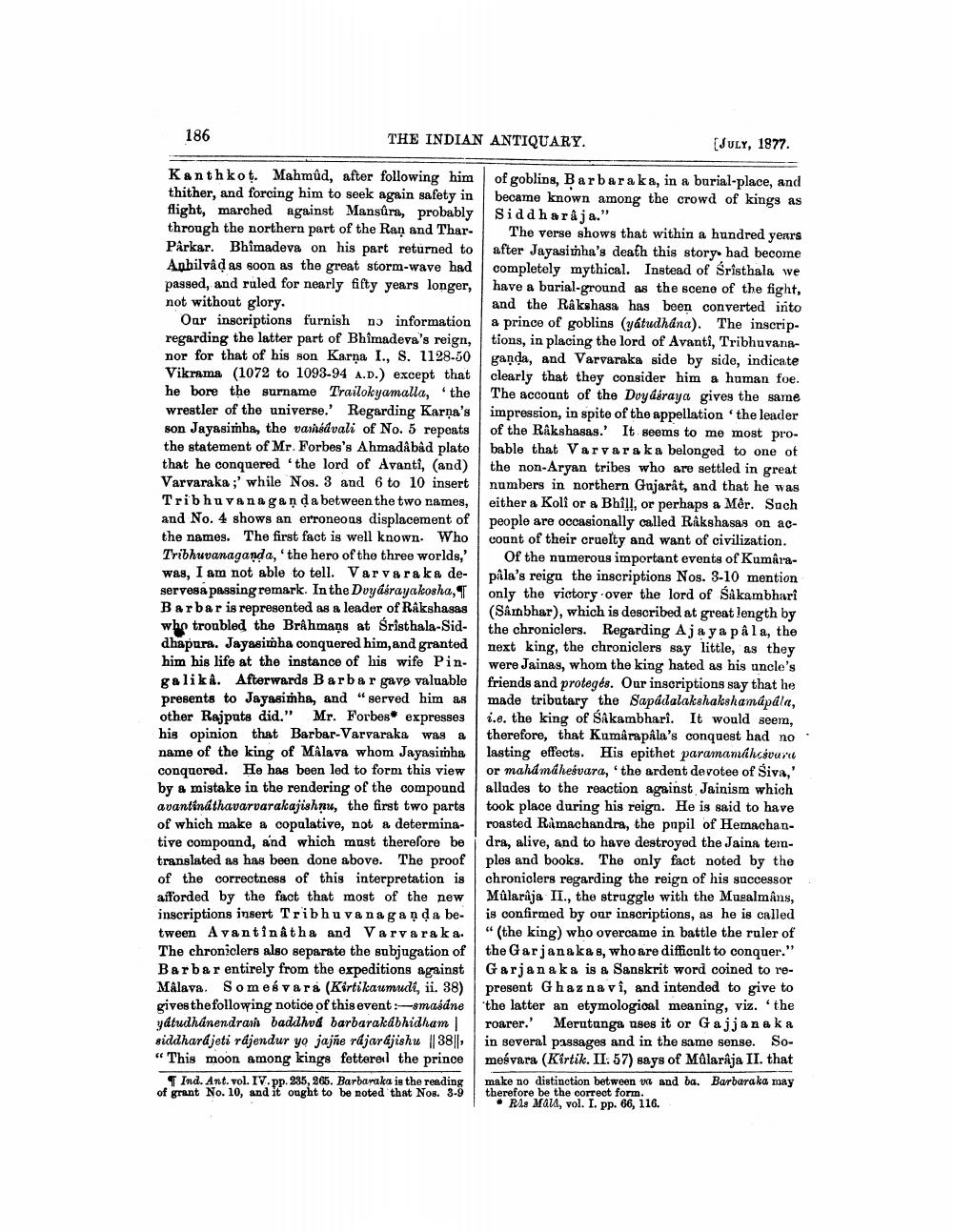________________
186
THE INDIAN ANTIQUARY.
[JULY, 1877.
Kanth kot. Mahmûd, after following him of goblins, Barbara ka, in a burial-place, and thither, and forcing him to seek again safety in became known among the crowd of kings as flight, marched against Mansúra, probably Siddharaja." through the northern part of the Ran and Thar. The verse shows that within a hundred years Pårkar. Bhimadeva on his part returned to after Jayasimha's death this story had become Anbilvåd as soon as the great storm-wave had completely mythical. Instead of Sristhala we passed, and ruled for nearly fifty years longer, have a burial-ground as the scene of the fight, not without glory.
and the Rakshasa has been converted into Our inscriptions furnish ny information a prince of goblins (yátudhana). The inscripregarding the latter part of Bhimadeva's reign, tions, in placing the lord of Avanti, Tribhuvananor for that of his son Karna I., S. 1128-50 ganda, and Varvaraka side by side, indicate Vikrama (1072 to 1093-94 A.D.) except that clearly that they consider him a human foe. he bore the surname Trailokyamalla, the The account of the Duy déraya gives the same wrestler of the universe.' Regarding Karna's impression, in spite of the appellation the leader son Jayasimha, the varnsdvali of No. 5 repeats of the Rakshasas.' It seems to me most prothe statement of Mr. Forbes's Ahmadabad plato bable that Varvara ka belonged to one of that he conquered 'the lord of Avanti, (and) the non-Aryan tribes who are settled in great Varvaraka ;' while Nos. 3 and 6 to 10 insert numbers in northern Gujarat, and that he was Tribhuvanagan da between the two names, either a Koli or a Bhill, or perhaps a Mér. Such and No. 4 shows an erroneous displacement of people are occasionally called Rakshasas on acthe names. The first fact is well known. Who count of their cruelty and want of civilization. Tribhuvanaganda, 'the hero of the three worlds,' Of the numerous important events of Kumarawas, I am not able to tell. Varvaraka de- pâla's reign the inscriptions Nos. 3-10 mention servesa passing remark. In the Duyasrayakosha, T
only the victory over the lord of Så kambhari Barbar is represented as a leader of Rakshagas (SÁrnbhar), which is described at great length by who troubled the Brahmaņs at Sristhala-Sid- the chroniclers. Regarding Ajaya pala, the dhapura. Jayasimha conquered him, and granted next king, the chroniclers say little, as they him his life at the instance of his wife Pin. were Jainas, whom the king hated as his uncle's galika. Afterwards Barbar gave valuable friends and protegés. Our inscriptions say that he presents to Jayasimha, and "served him as made tributary the Sapádalakshakshamápala, other Rajpats did." Mr. Forbes expresses i.e. the king of Śakambhari. It would seem, his opinion that Barbar-Varvaraka was a therefore, that Kumarapala's conquest had no name of the king of Malava whom Jayasimha lasting effects. His epithet paramamahcsvar! conquored. He has been led to form this view or mahdmdhesvara, the ardent devotee of Siva,' by a mistake in the rendering of the compound allades to the reaction against Jainism which avantináthavarvarakajishnu, the first two parts took place during his reign. He is said to have of which make a copulative, not a determina- roasted Rimachandra, the pupil of Hemachantive compound, and which must therefore bedra, alive, and to have destroyed the Jaina temtranslated as has been done above. The proof ples and books. The only fact noted by the of the correctness of this interpretation is chroniclers regarding the reign of his successor afforded by the fact that most of the new Mûlaraja II., the struggle with the Musalmans, inscriptions insert Tribhuvana ganda be- is confirmed by our inscriptions, as he is called tween Avantinátha and Varvaraka. "(the king) who overcame in battle the ruler of The chroniclers also separate the subjugation of the Garjanakas, who are difficult to conquer." Barbar entirely from the expeditions against Garjana ka is a Sanskrit word coined to reMálava. Somes vara (Kirtikaumudi, ii. 38) present Ghaznavi, and intended to give to gives the following notice of this event:-smaádne the latter an etymological meaning, viz. the ydtudhánendrai baddhvá barbarakábhidham roarer.' Merutanga ases it or Gajjanak a siddharájeti rájendur yo jajne rájarkjishu |38|| in several passages and in the same sense. So“This moon among kings fettereil the prince mesvara (Kirtik. II. 57) says of Múlaraja II. that
Ind. Ant. vol. IV. pp. 235, 265. Barbaraka is the reading make no distinction between us and ba. Barbaraka may of grant No. 10, and it ought to be noted that Nos. 3-9 therefore be the correct form.
# Rie Mar, vol. I. pp. 66, 116.




